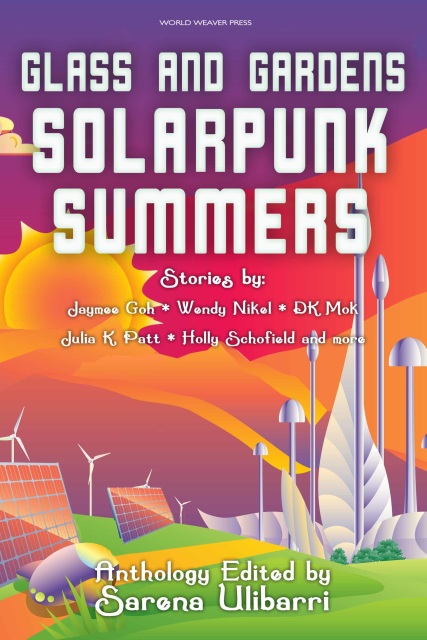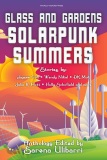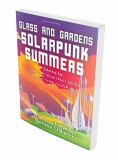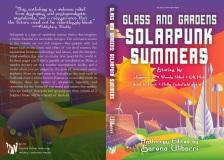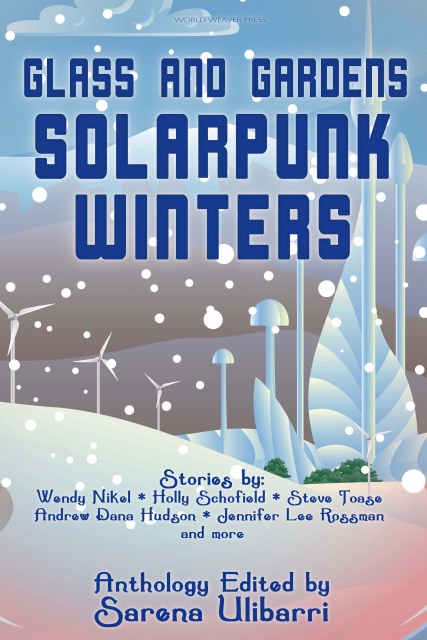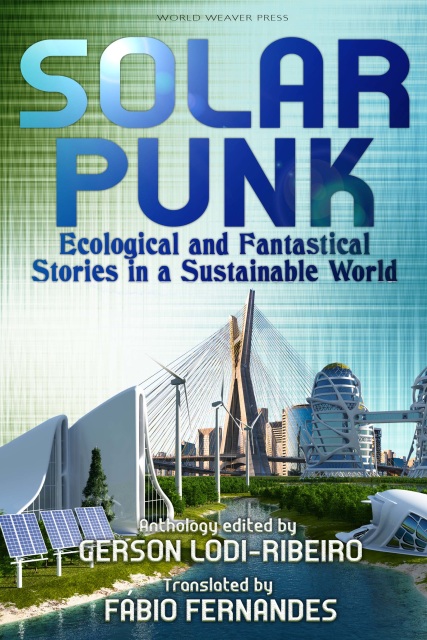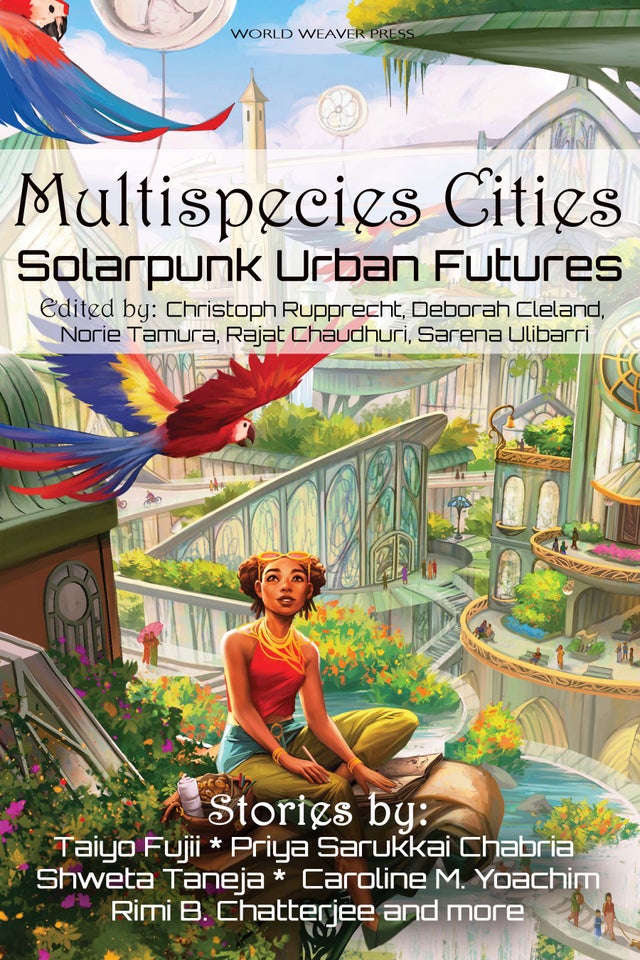- Store
- >
- Trade Paperback
- >
- Glass and Gardens: Solarpunk Summers
Glass and Gardens: Solarpunk Summers
SKU:
$13.95
$13.95
Unavailable
per item
Anthology edited by Sarena Ulibarri
Series: Glass & Gardens
Science Fiction / Short Story Anthology
Release Date: June 5, 2018
Trade Paperback
ISBN-13: 978-0998702278
Anthology: Approx. 87,000 words / 290 pages
Also available as an ebook
Find it Online:
Amazon
Barnes & Noble
Books-A-Million
Goodreads
Independent Bookstores
iTunes/Apple iBooks
Kobo
Wholesale: Ingram or direct: World Weaver Press.
Series: Glass & Gardens
Science Fiction / Short Story Anthology
Release Date: June 5, 2018
Trade Paperback
ISBN-13: 978-0998702278
Anthology: Approx. 87,000 words / 290 pages
Also available as an ebook
Find it Online:
Amazon
Barnes & Noble
Books-A-Million
Goodreads
Independent Bookstores
iTunes/Apple iBooks
Kobo
Wholesale: Ingram or direct: World Weaver Press.
Sold Out
DescriptionSolarpunk is a type of optimistic science fiction that imagines a future founded on renewable energies. The seventeen stories in this volume are not boring utopias—they grapple with real issues such as the future and ethics of our food sources, the connection or disconnection between technology and nature, and the interpersonal conflicts that arise no matter how peaceful the world is. In these pages you’ll find a guerilla art installation in Milan, a murder mystery set in a weather manipulation facility, and a world where you are judged by the glow of your solar nanite implants. From an opal mine in Australia to the seed vault at Svalbard, from a wheat farm in Kansas to a crocodile ranch in Malaysia, these are stories of adaptation, ingenuity, and optimism for the future of our world and others. For readers who are tired of dystopias and apocalypses, these visions of a brighter future will be a breath of fresh air.
Table of Contents"Caught Root" by Julia K. Patt
"The Spider and the Stars" by D.K. Mok "Riot of the Wind and Sun" by Jennifer Lee Rossman "Fyrewall" by Stefani Cox "Watch Out, Red Crusher!" by Shel Graves "The Call of the Wold" by Holly Schofield "Camping With City Boy" by Jerri Jerreat "A Field of Sapphires and Sunshine" by Jaymee Goh "Midsummer Night's Heist" by Commando Jugendstil and Tales from the EV Studio "Heavenly Dreams of Mechanical Trees" by Wendy Nikel "New Siberia" by Blake Jessop "Grover: Case #C09 920, 'The Most Dangerous Blend'" by Edward Edmonds "Amber Waves" by Sam S. Kepfield "Grow, Give, Repeat" by Gregory Scheckler "Cable Town Delivery" by M. Lopes da Silva "Women of White Water" by Helen Kenwright "Under the Northern Lights" by Charlotte M. Ray Excerpts
From The Spider and the Stars by D.K. Mok
Del’s childhood, like many others, was woven from enchanted tales. Every night, as the warmth of the day radiated back through the glass water-wall of her bedroom, Del curled up with her plush quokka and listened, enthralled, as her mother spun wondrous stories. These were never stories of dragons and fairies, mermaids and centaurs. No, these were stories of fierce young women with flocks of tree-planting drones, firing seeds into the barren sands and rolling back the desert. Or tales of ravenous locusts sweeping across the land in suffocating plagues, and the farmers who responded by cultivating carnivorous wheat. But tonight, there had been no story. Del waited in bed until even Quokka’s genial features seemed to furrow with impatience. “Wait here,” whispered Del. She was almost five, and therefore officially allowed to negotiate the terms of Bedtime. Stories were a requirement under Article Three, since she had fulfilled the conditions of Article Two: specifically, the Brushing of Teeth. She trod softly towards the sound of voices in the kitchen. Her mother sounded uncharacteristically frustrated; her father, uncharacteristically chipper. “It’s their loss,” he was saying. “There’ll be other competitions—” “Not like the Solaria Grande Exhibition.” Her mother’s voice was thick with disappointment. “It’ll be twenty years before it comes this way again—” “So we’ll travel to the next one—” “With all this gear? What if the truck overturns? The last thing we need is a hysterical headline like Mutant Bugs on Rampage! It’s hard enough getting people not to gag at the word ‘entomophagy’—” “Maybe we shouldn’t use that word next time. How about ‘alternative protein’?” There was a soul-crushing sigh. “People won’t eat spiders because they have too many legs, but they’ll happily eat crabs. They won’t eat shea caterpillars because they’re too gooey, but they’ll slurp down oysters. Gram for gram, insect protein is cheaper, healthier and more sustainable than red meat. To make a single beef patty, it takes two thousand litres of water. To make the same amount of cricket flour, you need a moist towelette and a tolerance for swarms—” “I know. And that’s why you’ll make this work. You don’t need some fancy prize. You have your passion, and your entomology degree. And you have me and my winning way with a hot wok and spices—” “And me,” Del blurted from the doorway. “I’ll help you look after the bugs.” “Oh, Del, daughter of mine…” Her mother scooped her up like a rugby ball, the comforting scent of ripe apricots and jasmine lingering in her mother’s thick brown hair. “Am I late for story time?” As the cicadas bleated their one-note love songs from the eucalypts outside, Del settled onto her sleeping mat, the straw cool against her skin. She slid her night terrarium a little closer, the bioluminescent mushrooms and glow-worms suffusing the room with a gentle blue-green radiance. “Can I have a story about ogres?” Del’s playmates at preschool had terrified each other with stories of child-guzzling ogres, and Del wondered if the ogre had considered eating cricket damper and jam instead. “Hmm… I don’t know many stories about ogres. Oh, wait, there is one very special ogre—the ogre-faced spider, Deinopis ravida. A huntress of the night who stalks her prey with a silken net, with eyes so keen and clever she can see the galaxy Andromeda.” And it was in this moment—her mind filled beyond capacity with this wordless, moonlit image of a stargazing spider—that Del chose her destiny. From The Call of the Wold by Holly Schofield Pedalling out of the shade of the Douglas firs, I heard the farming collective before I saw it. Squawking, bleating, angry barking—and that was just the people. I ground to a stop in front of the gate, careful to avoid the wild sorrel poking through the damp, crumbling pavement. “Olly Olly Umphrey!” I called over in my cracked old woman voice. The nearest person, a lanky man with a brown pony tail pulled exceptionally tight, frowned at my shout. His foot rested on a rusted cage with something brown and feathery in it. He glanced at me, my bicycle, and the small bike trailer that held my possessions, then back at the other two. The woman was waving a large and shiny cleaver in the face of a stocky, acne-scarred man. I wasn’t one to judge—well, I was—but my calves ached and my stomach was tired of deer jerky. I raised my voice a notch or four. “I don’t want to join your discussion, I was just hoping I could do a few chores—” “We don’t need any trade goods,” yelled the cleaver-wielder. “Go away, old woman!” “Ageist, much?” I yelled back. The driest summer in Vancouver Island’s recorded history meant my scalp itched continually, and a guest bunk sure beat out a dusty tent, but I didn’t let such comments slip past me. Not since I turned seventy last year. “Let her in,” the lanky man said. I pushed my bike along the high chain-link fence—the height of it intended to keep out the overly-numerous deer rather than human intruders—until I reached the gate. Neither of the other two had moved. The lanky guy sighed long and low. “By the power vested in me by Henkel’s Wold, let her in.” At his feet, the caged guinea fowl backed him up with an ear-piercing shriek. The short guy moved first, walking up to the lock and looking into the biometric screen. It gave a loud click. My heart did the hokey pokey as the smartcam swivelled toward me and facial recognition software did its thing. “Keeps out the riffraff, eh,” I remarked to the guy as the gate clicked again and swung open. “So what? We breed our own criminals,” he said, glaring back at the woman. She waggled the cleaver at him. “Sez you, Riley.” “Gah!” Riley turned to the skinny guy. “Did you see that? Whatcha gonna do about it, Aaron, waffle as usual?” With a sigh, I scanned the dark clouds overhead. Was a bit of comfort really worth enduring such an unhappy crowd? But I knew my solitary life wasn’t mentally healthy, any more than my cheese addiction. Surely I could hang my frayed Tilley here for one night. Besides, maybe I could help settle the dispute. I hadn’t been much use to anyone lately, maybe I could use my rusty people skills to at least calm ’em down. I sucked in a breath. “I think you people are the flea’s pajamas, doing what you do, way out here in the bush,” I said and smiled blankly like the kindly old woman I hoped I looked like. “A bunch of nice people like you, nothing more to talk about than some chicken.” My tactic worked—they all looked as sheepish as ewes at a shearing competition. I stuck my hand out toward the one named Riley. “Julie Leung, traveller extraordinaire.” From New Siberia by Blake Jessop I fall backward off the solar collector, and for an instant my splayed fingers brush the dawn. The drop is long enough to try naming constellations I don’t recognize in the alien sky. I hit the sand on my back. The impact is surprisingly soft; I survive it. Air rushes out of my lungs like I’ve stolen it and my new world wants it back. I am unwelcome, and the desert swallows me to drive the point home. I yell her name. I can’t pronounce it as well as she pronounces mine. Amphisbaina. Try it. She slithers down from the array with the speed I once managed in the snow of Arkhangelsk. I go blind, drowning in silica, but I can feel her move. The desert is a muted membrane, like the surface of cloudy water, and when she bellies down and reaches for me with both hands I have already broken the surface tension and disappeared. Amphisbaina pulls me backward from the quicksand with a long hiss of effort. The sheath she wears scrunches up as she writhes across the face of the dune. I scrabble inelegantly as she pulls. I can feel the subtle power of her tail; her entire torso adheres to the surface of the desert, reading it, and she waves herself the way I might have, once, if I were treading water. My shoulders tumble into her chest and we flop onto firmer ground. “Nadezhda,” she says, her breathing a hiss, and I hear her layer you clumsy creature into the three Cyrillic syllables. Nagan speech is panharmonic. They use tone to shade meaning, not adjectives. Amphisbaina chastises me with my own name. I struggle to my feet, shaking sand from my gear. Individual grains are forming chemical bonds with my sweat, leeching water out of me. I travelled between the stars to settle here, to save my species. We found a new earth, a chance to start the great voyage over, only to discover our new home already occupied. Learning to communicate, our hosts selected Naga to describe themselves. They call us what we call ourselves, Human, because they’re far better at learning our languages than we are pronouncing theirs. Amphisbaina does a little shimmy and the sand drops from her easily. She straightens her sheath. Her scales are just a few shades darker than the dunes. I would say she stands my height, but I do not know the right verb. She rears, I suppose, at my eye level; leans back against her long tail and crosses sinuous arms. There is a little sympathy in her posture. Faint pity. “Watch,” Amphisbaina says, and searches for a word, “your step.” About the Anthologist
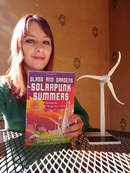
Sarena Ulibarri is Editor-in-Chief of World Weaver Press, and she is also a fiction writer who has been published in Lightspeed, Fantastic Stories of the Imagination, Weirdbook, and elsewhere. Her solarpunk story "Riding in Place" appeared in the anthology Biketopia: Feminist Bicycle Science Fiction Stories in Extreme Futures. She lives in a solar-powered adobe house in New Mexico, and can be found online at SarenaUlibarri.com and @SarenaUlibarri.
|
More Like ThisPraise"This anthology is a welcome relief from dystopias and postapocalyptic wastelands, and a reassurance that the future need not be relentlessly bleak."
--Publishers Weekly "Each of these stories is a window into a world where issues like climate change and food shortages are approached with a joyful creativity. The variety in character, narrative approach, and setting offers something to appeal to a wide variety of readers, especially those who look to anthologies to find new authors to follow." --Booklist "I came away from this anthology with two points: clean energy is a far healthier alternative to fossil fuels, and it is far too easy for humans to destroy a planet. Both are important for their own reasons. 'Glass and Gardens' edited by Sarena Ulibarri piqued my curiosity on global warming and climate change, inciting me into some research of my own. That’s the mark of a good book if I’ve ever seen one." --Reader Views "If you enjoy solarpunk or are interested in exploring it as a genre then this is an excellent place to start! I highly recommend this and hope more collections will be published in the future!" --BrenhinesBooks “This anthology gives you just enough story, science, and hope…I’ve been needing a book like this in my life.” --Utopia State of Mind "[T]he seventeen stories in this anthology are speculative in the very best sense of the word: They speculate on how our future could be, rather than how it must be, and provide an optimistic view which somehow manages to escape being escapism." --SFF Reviews "I’d heartily recommend Glass and Gardens: Solarpunk Summer to anyone who is in the mood for an optimistic vision of what the future might be like for humans and all of the other creatures who live on Earth." --Long and Short Reviews "Humans have spent generations destroying the planet. These seventeen stories explore the various ways to work with the world to improve it. From technological solutions to simple planning, the characters in these stories find a way to work with the world. " --SFRevu "If you like your science fiction and fantasy with a hopeful outlook and a diverse cast of characters, you’re likely to find many of the stories in Glass and Gardens to your liking!" --Mad Scientist Journal "Glass and Gardens tends toward optimism; its stories imagine technologies that allow communities to cope with the realities of a warmer planet in fantastic ways…These are not stories in which everyone’s problems have been solved, and their narrative conclusions are not always tidy, but they have an unabashed positivity." --Longreads "[T]his anthology successfully probes science fiction stories that might be solarpunk in order to find the core of solarpunk. Even with stories that weren't for me, I still appreciated the larger framework of questions being posed to the reader." --Consuming Cyberpunk |

